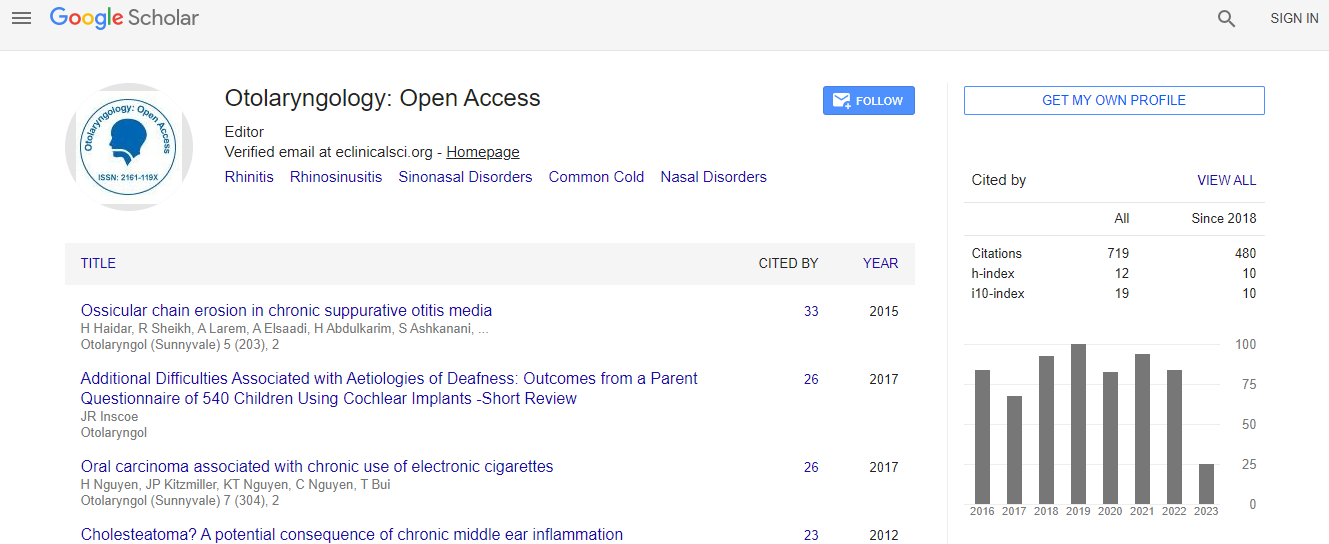Our Group organises 3000+ Global Conferenceseries Events every year across USA, Europe & Asia with support from 1000 more scientific Societies and Publishes 700+ Open Access Journals which contains over 50000 eminent personalities, reputed scientists as editorial board members.
Open Access Journals gaining more Readers and Citations
700 Journals and 15,000,000 Readers Each Journal is getting 25,000+ Readers
Google Scholar citation report
Citations : 925
Otolaryngology: Open Access received 925 citations as per Google Scholar report
Otolaryngology: Open Access peer review process verified at publons
Indexed In
- Index Copernicus
- Google Scholar
- Sherpa Romeo
- Open J Gate
- Genamics JournalSeek
- RefSeek
- Hamdard University
- EBSCO A-Z
- OCLC- WorldCat
- Publons
- Geneva Foundation for Medical Education and Research
- ICMJE
Useful Links
Recommended Journals
Related Subjects
Share This Page
Effect of medical treatment on eradicatio of biofilms in CRS
2nd International Conference on Ear, Nose and Throat Disorders
Lakshmi Vaid
University College of Medical Sciences, India
Keynote: Otolaryngol (Sunnyvale)
Abstract
Chronic rhinosinusitis is one of the most common reasons for physician office visit, lost productivity in the work force and antibiotic prescription. Recent researches on the pathogenesis of CRS have been focused on the potential role of biofilm in the recalcitrant nature of disease. Anti-inflammatory therapies favorably topical steroids with low dose macrolides have received an increasing interest in recent years. Studies have shown some influence on polyp size and patient symptoms also, on biofilm formation in many steps. Our study group comprising of 48 patients, of which 24 were given macrolides along with steroidal spray and rest 24, steroidal spray alone for 4 weeks underwent FESS surgery. We compared the pre-operative and postoperative SNOT-20, endoscopic score, CT, scores and biofilm presence and density in both groups. Significant improvement was seen in the SNOT-20 scores with p-value of 0.011 and endoscopic scores with p value of 0.001 in group having macrolides along with steroids pre-operatively however the scores post-surgery didn�t show any such significant change in both groups. The efficacy of macrolide with nasal steroidal spray or nasal spray alone showed no further benefit in the subjective outcome measures post operatively. Also, no statistically significant eradication of biofilms or decrease in density could be appreciated in both groups. Furthermore, there was no significant difference in recurrence rate. Our result demonstrated the subjective improvement in patients of macrolide group post treatment which could be attributed to its anti-inflammatory effect. However, the in ability of the macrolide group to represent any change in density of biofilm refutes many available studies. Even though macrolides in combination with nasal spray reflected some improvement in the secondary outcomes but the primary outcome of eradication of biofilms couldn�t be achieved. Hence, more research is needed to answer this topic and confirm the effectiveness of clarithromycin on mucosal biofilms.Biography
Lakshmi Vaid has completed her MBBS and MS (ENT) in 1982 from SMS Medical College, Jaipur, Rajasthan University. She is having work experience of more than 35 years and at present, she is the Director, Professor and Head of ENT Dept. in University College of Medical Sciences and GTB Hospital, India. She has published more than 45 papers in reputed journals. Email:Prof.vaid@gmail.com

 Spanish
Spanish  Chinese
Chinese  Russian
Russian  German
German  French
French  Japanese
Japanese  Portuguese
Portuguese  Hindi
Hindi 
